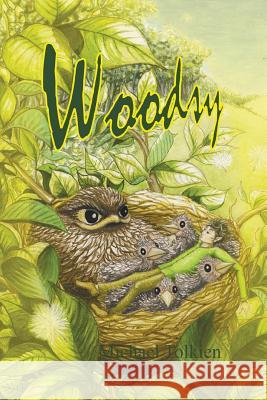Woodsy » książka
Woodsy
ISBN-13: 9781910162446 / Angielski / Miękka / 2014 / 78 str.
Woodsy
ISBN-13: 9781910162446 / Angielski / Miękka / 2014 / 78 str.
(netto: 60,94 VAT: 5%)
Najniższa cena z 30 dni: 62,94
ok. 16-18 dni roboczych.
Darmowa dostawa!
Woodsies can take on any human shape, and have appeared in larger and finer forms than we can ever hope to have, though mostly they just need well-disguised bodies strong enough to care for plants that like wood-filtered light. They are mainly practical, wise, and helpful, but all families have misfits and trouble-makers and sometimes young woodsies like Leaf-lag won't grow up and have to learn the hard way.
This rebellious, 'ne'er-dowell' woodsy only half listens to his lessons and training, and after idling his way through summer is frightened to face a season of work to make up for this during the warm and secure underground winter festivities. He decides to go his own way, but the cold and hunger are too much for him, so he takes refuge in a dolls' house inside the playroom of a large house. The two young children, whose noise and size at first terrify the visitor, are delighted with his presence, a secret close-kept from adults. But because he has not paid full attention to his training, every trick he plays to show off cannot be reversed, and this gets his friends into more and more trouble. He becomes disruptive, selfish, isolated and cowers away in fear of being trapped. After many adventures, including a night in a mouse trap, he has to make for the closed doors of the winter palace, beg for admittance and face up to the discipline of his teachers.
Born in Birmingham in 1943, Michael Tolkien grew up in rural South Oxfordshire and North Yorkshire. He studied classics and English at St Andrews and Oxford. Settled in Rutland since 1968, he worked as a secondary school teacher until early retirement in 1994.
His verse has been published in two booklets and five full collections, which have been widely and favourably reviewed. He recently adapted and developed two tales by Florence Bone, a forgotten children's writer. He presented his versions in narrative verse as Wish and Rainbow. This new tale for younger readers is similarly adapted from the work of Hilda Adshead's now rare little book, The Idle Fairy.
Woodsies can take on any human shape, and have appeared in larger and finer forms than we can ever hope to have, though mostly they just need well-disguised bodies strong enough to care for plants that like wood-filtered light. They are mainly practical, wise, and helpful, but all families have misfits and trouble-makers and sometimes young woodsies like Leaf-lag wont grow up and have to learn the hard way.
This rebellious, neer-dowell woodsy only half listens to his lessons and training, and after idling his way through summer is frightened to face a season of work to make up for this during the warm and secure underground winter festivities. He decides to go his own way, but the cold and hunger are too much for him, so he takes refuge in a dolls house inside the playroom of a large house. The two young children, whose noise and size at first terrify the visitor, are delighted with his presence, a secret close-kept from adults. But because he has not paid full attention to his training, every trick he plays to show off cannot be reversed, and this gets his friends into more and more trouble. He becomes disruptive, selfish, isolated and cowers away in fear of being trapped. After many adventures, including a night in a mouse trap, he has to make for the closed doors of the winter palace, beg for admittance and face up to the discipline of his teachers.
Born in Birmingham in 1943, Michael Tolkien grew up in rural South Oxfordshire and North Yorkshire. He studied classics and English at St Andrews and Oxford. Settled in Rutland since 1968, he worked as a secondary school teacher until early retirement in 1994.
His verse has been published in two booklets and five full collections, which have been widely and favourably reviewed. He recently adapted and developed two tales by Florence Bone, a forgotten childrens writer. He presented his versions in narrative verse as Wish and Rainbow. This new tale for younger readers is similarly adapted from the work of Hilda Adsheads now rare little book, The Idle Fairy.











